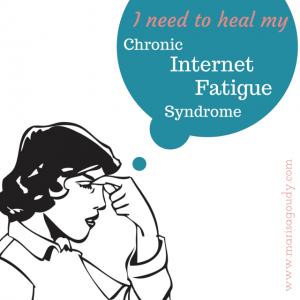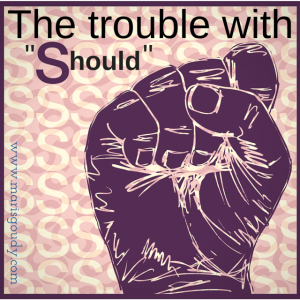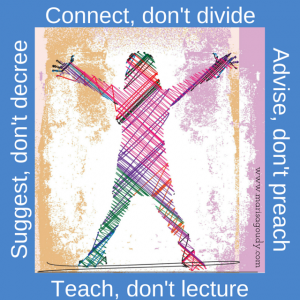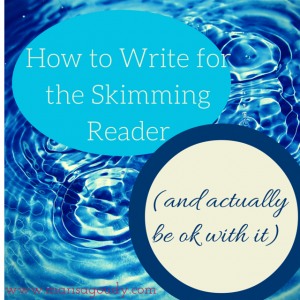
BLOG
How to Heal Chronic Internet Fatigue Syndrome
Sovereign Standard, Issue 21 What’s the number one reason bloggers quit writing?
What’s the number one reason bloggers quit writing?
Forget that… what’s the number one reason you want to quit the writing practice that's mean to build your business or your professional platform?
Because nobody seems to read what you write, right?
It’s one thing to know that most online readers are just skimming, it’s another to feel like you’re not even reaching those eyeballs.
 You slip into despair if your site stats don’t match up to the investment you made in the post. Who can blame you? Writing a from-the-heart, meaningful, useful post every week or two takes a lot out of you, but it’s a labor of love.
You slip into despair if your site stats don’t match up to the investment you made in the post. Who can blame you? Writing a from-the-heart, meaningful, useful post every week or two takes a lot out of you, but it’s a labor of love.
It’s the next step, the “doing social media” to get the link in front of prospective clients and readers that pushes the whole venture into mission: impossible territory.
Unless you have a fully charged phone while you’re in line at the DMV or killing time someplace similar. In that case, you have time to share the blog post on every social media platform you’ve ever heard of.
Those deep dives into social media can be really useful, but soon they teach you something vital...
Social Media Isn’t About Posting Strategy or Likes, It’s About Real Relationships
Getting people to read what you write really isn’t about crafting Tweets and status updates and making everything sweet-as-pie Pinnable.
If you don’t have the online relationships, even the best piece of content is likely to languish in obscurity on your under appreciated blog.
As social media matures and the networks figure out how to monetize their “free” platforms, it becomes increasingly hard to hear and be heard above the noise.
Instead of tuning in to every Mari Smith email and Social Media Examiner podcast like I used to, I’m focusing on nurturing real connections with people I care about. It's the only way to heal a modern disease I bet you know all too well...
Are you suffering from Chronic Internet Fatigue Syndrome?
My case of Chronic Internet Fatigue Syndrome flares up regularly. Sick of the sales pitches, the false promises, the self aggrandizement, and the sheer meaninglessness of it all, I burn out and hide myself in a few good novels. (Or a Candy Crush Soda binge… don’t judge me.)
During these hibernation periods I tend to lose hard won footing in the social universe. The disappearing acts make me seen inconsistent and, hence, I'm easily forgotten or dismissed.
It’s easy to claim “because my kids” but really, I just can’t sustain these online “connections” that aren’t forged in real, sustaining reciprocal relationships.
At the early stages of building a platform and becoming a trusted voice in your area of expertise, it feels like it’s all about giving, producing, and introducing yourself. It's so easy to burn out. Eventually, you’ll reap what you sow and see a return on all that effort, but only if you are offering yourself and your writing to the right people.
The Writer’s Cure for Chronic Internet Fatigue Syndrome?
 Reach.Connect.Uplift Women
Reach.Connect.Uplift Women
As with any chronic ailment, the goal is to break the cycle and enjoy sustained health and vitality. You want to find a sustainable online community that loves to read what you write and offers up content that betters your personal and professional life as well.
You do, right?
Ok, so come join me over at the Reach.Connect.Uplift Women Forum because I think it’s the cure for digital burnout.
Just when I realized I needed to break my feast or famine social media efforts and focus on an online community that gave as good as it got from me, founder Lany Sullivan told me about how the RCUWomen Google+ group was migrating to its own membership forum.
As Lany describes it, "We decided to go old school and build a forum on our website that we could really let loose and have a broader reach. "
What, it's 2015 and we're back to a message board? If you're getting lost in the social media crowds, it may be just the medicine your content creator's soul craves.
Here's Lany's explanation of "why a Reach.Connect.Uplift Women Forum, why now?":
We want a platform that allows us to really highlight our members, provide valuable resources, and be able to monitor and manage it with maximum efficiency. Social Media doesn’t do that for us or our members.
Building an audience off social allows us to have a greater impact, better connections and deeper relationships with our members. Instead of sifting through the millions of posts on social everyday, our members can drop by the forum for some of the top content in the market. Plus, we have some additional SEO and link building benefits that has a positive impact for everyone.
So, will you join me over on the new forum? My social streams and my inbox are too full and I'm missing your great content, but I know I'll see it if you become a RCUWoman too (and guys, if you've got the stones to join the ladies, we'd love to have you too!)
Want to connect with your reader? Cut "should" from your writing
Sovereign Standard, Issue 19  Nobody likes a “should-er.” (No, not shoulder… we all need a shoulder to cry on sometimes and the entire game of baseball would be wrecked if there weren’t shoulders to rest the bats on.)
Nobody likes a “should-er.” (No, not shoulder… we all need a shoulder to cry on sometimes and the entire game of baseball would be wrecked if there weren’t shoulders to rest the bats on.)
 I’m talking about that evil “s” word - “should.”
I’m talking about that evil “s” word - “should.”
“You should…” reeks of unsolicited advice, shaming, and regret.
I check every piece of writing I publish to be sure that I avoid that “s word.” Readers come to me for insights into how to write brilliant stories and copy to support their creative work. You’re not coming to me for a wagging finger and the implication “you likely know better, but you’re still doing it wrong.”
“Should” damages personal relationships & teaching relationships
This is from Hannah Braime in Why the Word “Should” Can be Harmful and 3 Empowering Alternatives. Substitute “authority in your field” for “friend or partner”:
I realized that when I told other people they should or shouldn’t do something, I wasn’t respecting their ability to make the best decisions for themselves. That didn’t fit with my personal philosophy (that people are free to do what they want as long as they’re not harming others), and I knew I wasn’t being the best friend or partner while I was using “should”-based vocabulary.
I love what teacher John Spencer has to say about the problem with should. Replace “teaching” with “educating, engaging, and inspiring through content marketing”:
See, the problem with "should" is that it places all of teaching into rigid, binary, either/or, right/wrong boxes. It takes away the individuality, the autonomy, the creativity and the contextual knowledge required to teach well. Any strategy, any tool, any medium, any resources has benefits and drawbacks. The hard part, the part that requires patience and humility, is learning how to refine our craft as teachers based upon the needs of students.
But “should” is such a handy word for authorities, isn’t it?
Mentor and consultant Blair Glaser has made the brave and beautiful decision to leave leadership for authority. She’s making “authority” sexy - so stop thinking about buttoned up authority figures and start imagining a connected, compassionate someone who walks her talk and knows her stuff.
Her first paragraph in the blog post that announces her shift away from leadership and toward authority is laden with “shoulds” (underlines are mine!):
Read enough [books on leadership], and you’ll start to see a formula on how leaders should BE: authentic (hard for many to really know what that means); humble; curious; calm, empathetic, open, and funny.
You’ll also collect a list of behaviors of what leaders should DO: Serve (this can border on religious); listen more than talk, and empower by coaching.
They shouldn’t act bossy, they don’t “manage,” and, heaven forbid, they certainly don’t micromanage.
Blair goes on to describe her vision of authority (by the way, there isn’t a single “should” in the post once she starts riffing on her beloved new concept):
Personal authority comes from the ability and willingness to be the author of our own lives.
Authority in this context is the antidote to feelings of helpless and hopelessness, to the victim role. With a little work you can find your authority in almost any situation.
As I like to say, authority = confidence plus creativity. This is what makes authority irresistible as a force that will draw people to you.
Based simply on how Blair phrased these passages, what you rather strive to be -- a wannabe leader who is always looking over her shoulder trying to follow the shoulds and avoid the should nots OR an authority who employs creativity and confidence to be an irresistible draw?
You don’t need “should” to own your authority and offer advice that matters
The word “should” inherently separates.
If you berate yourself with “I should’ve…” language you’re creating a barrier between an ideal you and a real you that never measure up (I should eat better, I should sleep more, I should return emails faster…).
If you fill your writing with shoulds you stand apart from the reader, creating an ideal world that may make them feel inadequate.
 Connect, don't divide. Teach, don’t lecture. Advise, don’t preach. Suggest, don’t decree.
Connect, don't divide. Teach, don’t lecture. Advise, don’t preach. Suggest, don’t decree.
There’s almost always an alternative to “should” in any sentence you write. Substitute a more evocative, specific word and watch your blog posts and other professional writing take on a new tone that invites people to learn more from you - the compassionate, down-to-earth authority who is always there to help.
I’m always here to help you with your writing whether it’s in fine tuning your word choice or developing your editorial strategy. Learn more about what I have to offer on my services page.
Before you waste a summer day inside writing a blog post, read this
Sovereign Standard, Issue 18  This year, you're going to put “lazy” in hazy days of this summer - in a very good way.
This year, you're going to put “lazy” in hazy days of this summer - in a very good way.
You deserve this kind of warm weather downtime. You need long days of lazy moments in order to replenish your creative resources. A good break is what you need refill your well of patience and compassion - for your clients, your family, and yourself.
In order to make time for those guilty pleasure novels and to be truly present for the firefly chasing, you have to make the hours you do work a heck of a lot more efficient.
What part of your business needs to become quickest and easiest as the temperatures rise? The thing you’re most likely to ignore and procrastinate about -- your blog and your newsletter writing.
Your business needs you to keep writing this summer, but you need summer to be like summer
 It may be tempting to hang a “see you in September” sign on your blog, but you’d be missing a valuable opportunity. Many people use their “lazy” summer time to Google fresh solutions to their problems and do that professional research they never have time to do during the average work week.
It may be tempting to hang a “see you in September” sign on your blog, but you’d be missing a valuable opportunity. Many people use their “lazy” summer time to Google fresh solutions to their problems and do that professional research they never have time to do during the average work week.
Imagine this: while you are on the beach with your kids, someone is replying to your email newsletter and asking to set up an appointment that will guarantee you have enough money to pay for that last week of summer camp.
That is so much more likely to happen if you stay present online during July and August by publishing quick, meaningful blog posts and keeping in touch with your list.
The one thing you have to do to produce those quick, meaningful summer blog posts (Hint: it’s not about brainstorming ideas or composing a killer title)
You need to simplify.
For many creative entrepreneurs, “simple” is a bad word - it implies facile and “simplistic” and your work is deep and meaningful (dammit!).
Or, “simple” is an impossible dream. When a business sits at the core of your livelihood, your creative output, and much of your sense of self, it’s bound to be a nuanced, multilayered affair.
If you feel like the business is entangled in just about everything, writing for your personal stories for your beloved clients is anything but quick and easy.
Yes, friend, you are as rare as a glitter dusted zebra-striped unicorn and as complex as Superstorm Sandy, but your next blog post doesn’t need to be - really!
Two ways simplify the story and produce blog posts before they even miss you at the beach
1) Give 25%. You had a flash of insight during your morning jog? Jot down as much as you can then walk away for a while.
Come back to your notes and ask yourself how many ideas were really included in that flash of insight. It wasn’t just one perfect ah-ha - you were pounding the pavement for a good 45 minutes! You don’t want to get stuck inside writing a 3000 word epic. You want to offer up 750 words of succinct quality content. Either strip away all the extra stuff and toss it as the unnecessary padding it is or save it for next week’s post.
2) Recycle. Didn’t have a stroke of brilliance during your run? (Because, honestly, it’s vacation and there was that last bottle of chardonnay that just had to be finished before bedtime.) That’s great.
Go back and read one of those wicked long posts you dragged out of yourself over the winter. You know, one of the missives that you yourself have trouble reading all the way through? Pluck out one idea and expand on it. Or, if you’re proud of all the content because it’s central to your brand vision, break it into an easy-to-digest list and pare down the language for your lazy summer readers.
Simple writing takes practice
There’s this delicious Italian word, "sprezzatura.” It means “studied nonchalance.”
Someone who exhibits “perfect conduct or performance of something (as an artistic endeavor) without apparent effort” is simply glowing with the qualities that marked a successful 16th continental century courtier.
I learned about sprezzatura when studying Yeats as an undergrad. If anyone slaved himself to produce a line that was achingly simply and painfully profound, it was that Irish poet. But, he kept it up for a lifetime and became one of the greatest writers who ever lived.
You, my sweet summer friend, may also be destined to earn a Nobel Prize one day. I won’t stop you from delighting in every difficult task related to reaching that great height, but I will remind you that the blog posts your writing during the summer of 2015 are not going to make or break your chances with the Scandinavians.
It’s hard to simplify your ideas and to offer the quick and easy version of your brilliance because something as foolish as enjoying the sunset demands your attention, but if you’re going to be worthy of that next client - or that Nobel Prize - you have to give it your best shot.
I'm here to help you discover your own simple writing style. Let's talk about how hiring me as your writing coach can ease your summer writing load.
How to Write for the Skimming Reader (and actually be ok with it)
Sovereign Standard, Issue 17 If you’re skimming this post, you’re “doing the internet” right. You’re granting this piece just enough attention to glean useful information. And, if it would be of interest to the people you wish to engage, you’ll share it with a brief comment that shows you’re paying attention to important things.
If you’re skimming this post, you’re “doing the internet” right. You’re granting this piece just enough attention to glean useful information. And, if it would be of interest to the people you wish to engage, you’ll share it with a brief comment that shows you’re paying attention to important things.
If, as a writer, I’ve done the internet right, you find it easy to breeze through these 1600 words. You get what you need, How to Write for the Skimming Reader (and actually be ok with it), and move on.
Headers help you navigate. Lists help to break the main ideas into bite sized portions. Bold passages show you when to pay attention.
 Yes, there are technical points to master - they matter (find more steps on doing that below). But you know there's more to writing a post that people care about than "just make it skimmable.”
Yes, there are technical points to master - they matter (find more steps on doing that below). But you know there's more to writing a post that people care about than "just make it skimmable.”
In order for something to read quickly and easily, you as the writer have to put in a heck of a lot of time and effort.
Does that sort of make you want to cry?
The internet really has changed how we read & think
You want to be available to your potential clients, customers, and readers, so you write content and post it online.
Even if their attention is scattered, it’s something, right?
The goal is to give people just enough in a blog post to engage their curiosity. Once you've intrigued them, they’ll invest their attention in a longer piece of your writing (a book either on their tablets or in print). When blogging is part of your content marketing strategy, you’re hoping that readers who got free content will soon spend money on your product or service.
You’re hoping that your readers have what Tufts University's Maryanne Wolf calls a “bi-literate brain.” They'll switch from a quick skim to an in-depth relationship with your work.
Professor Wolf researches the effects of this online skimming on our ability to read like we're "supposed to." Listen to this Note to Self podcast for assurance that you’re not alone if you feel like your brain works differently these days. Many are finding it hard to jump from speedy info consumption to contemplative, focused reading. (I'm just grateful I had to read Ulysses before the Web rewired my mind!)
In a Washington Post article, Wolf says:
We can’t turn back. We should be simultaneously reading to children from books, giving them print, helping them learn this slower mode, and at the same time steadily increasing their immersion into the technological, digital age. It’s both. We have to ask the question: What do we want to preserve?
Personally, I want to preserve that alchemical process of turning thought into written words that inspire a reader and change the world - even if many readers are just skipping through, looking for the quick news they can use.
How do you write when your reader's brain has been altered?
These sources don’t explore what it means to write with and for these new brains. As Note to Self says about what they found in the course of this episode:
It's another example of a phenomenon we see over and over again: If you feel like a device or any technology has messed with you, you might be onto something... way before any researcher can prove it.
The internet has messed with the way your readers engage with your content - now what?
[tweetthis]The internet has messed with the way your readers engage with your content - now what?[/tweetthis]
As a writer who lavishes her writing talents on screen-only material, this is how I cope with the reader who’s just skimming through:
- Accept that blogging is a bit like Zen sand art
- Write “good enough to be proud of” blog posts that meet my audience's expectations of an online reading experience
Blogging: an object lesson in impermanence
Blogging is an ephemeral art - and I believe it can and even should be an art, not just a perfunctory advertising technique.
Writing for the internet is a lesson in accepting the impermanent nature of life. Even posts that go viral get shunted off the front page eventually.
I think we can go further to say that blogging is also a spiritual practice. After all, blogging teaches you how to resist attachment. You simply cannot expect specific outcomes and end up feeling successful.
A blog is part of the business long game. There’s no guarantee that any post will bring in a dime. If there is an ROI, it’ll be cumulative and hard to trace to this one bit of writing. Instead, each post builds a relationship and takes a potential client that much closer to trusting you with their investment.
Most of the gifts of blogging come through the practice…
- The practice of writing each post gives you a chance to explore ideas as they occur to you. You can spend a few hours thinking deeply about how to communicate your thoughts into comprehensible messages. That sort of deep thought helps you maintain your bi-literate brain.
- The practice of maintaining a blog and writing over time gives you the chance to examine how your visions has grown and changed. You are able understand the relationships between your ideas and develop them into something more lasting like a book or a program.
A blog post is impermanent and they're just skimming it anyway - does it have to be perfect?
One of the first lessons in living without attachment I ever learned: let go of perfection. (As a writer who gets paid for typo-free prose, this was a hard one for me.)
Perfectionism really does equal paralysis. It also is responsible for business writing that never gets done and countless client relationships that never had a chance to get started.
So, “chuck perfect” as Karen Brody says.
Instead, focus on consistently creating material that is just good enough to stake your professional reputation on. Not every post needs to be a magnum opus. (Though keep in mind: you just never know when a particular passage is going to be your all important first impression.)
5 Features of a Good Enough to Be Proud of Blog Post
- Focused. The post is designed to convey one single, elegant idea. Take the pressure off yourself and the post itself by allowing it to perform a single simple task. Chances are, you can always get three posts out a single “ah ha!” moment. Dare to be brief or to go deep with one concept.
- Well-written: The post is as close to typo free as you can get after three read throughs. People can look past a few errors, but consistent oopses will erode your credibility. If you’re killing yourself to catch the missed words and you stress over every potential there/their/they’re humiliation, retain me as your writing coach and editor.
- Clear & organized: If your reader wants to skim, help them! Cut adjectives. Use small words and short sentences.Use headers that a clear rather than clever so your reader skip around as they please. Break ideas down into lists even if that offends your sensibilities as a “real” writer.
- Story-driven: The post is framed by a story or uses storytelling to convey main ideas. You use stories to give readers a taste of who you are, but also to engage yourself in the process. Stories breathe life into information. Don't lose yourself (and the reader) in your autobiography, but do allow your personality to shine through.
- Relevant: If the post is going to appear on your business blog, it has to relate to a product or service you offer or speak directly to the questions and concerns of your ideal client. Wrote a beautiful essay about seeing an eagle in flight or want to share your opinions on your favorite Netflix drama? That’s nice. Don’t blog it here. What you publish serves the mission of your business - to solve the problems of your customers and clients. If it doesn't, put it on your personal social media profile or submit it as a guest post someplace else.
But does it still hurt that you’re getting skimmed over?
No one has ever accused me of being particularly “zen” - at least not with a straight face. I strive to practice this non-attachment thing and ignore my stats and trust good content to make its own way (with some strategic social sharing, of course). Sometimes, however, it seems like we’re in a permanent state of imbalance - pouring all this exacting energy into writing something that people skim and consume rather than read.
People are turning to podcasting and YouTube for this very reason. I understand the attraction, but I still believe that it’s worth writing for your business - especially when you’re armed with the right mindset and understand that the rewards of writing may emerge far in the future.
Why it’s important to keep writing - and writing well - for the online readers
- You’re smart and literate. There’s a great chance that your ideal clients and customers are too, If you like to write, the person who thinks you’re perfect probably likes to read. That’s a good enough place to start - even if they’re "just" skimming your blog.
- Writing helps you think. It helps you discover new ideas and develop them from zygotic in the shower thoughts into big, beautiful visions that change lives.
- Though the human brain was not designed to read and write, we’ve been doing it for over 5000 years. I’m going to side with tradition on this one and conclude that we won’t stop reading in just one or two technology drenched generations
I’d love to help you contribute to the perpetuation of the English language. Oh, and help you communicate your ideas to your audience too. Here’s how I can help you as your writing coach.
Does your business need a blog? Depends on what you need from your business
Sovereign Standard, Issue 16 I’m a frugal lass. I squeeze the toothpaste tube for a week longer than any sane person would and I still manage to have fresh breath.
I’m a frugal lass. I squeeze the toothpaste tube for a week longer than any sane person would and I still manage to have fresh breath.
If there’s still some meaning to be eked out of a revelation like “I gotta quit entrepreneurship,” I’m going to find it. I’m obligated to find it. (Yeah, I get that this can be obsessive, exhausting, and self-defeating.)
 Then I’m going to spend a few hours crafting it into words. And then I am going to share it with my readers - even if the article doesn’t take me one inch closer to attracting copywriting clients or further my creative projects.
Then I’m going to spend a few hours crafting it into words. And then I am going to share it with my readers - even if the article doesn’t take me one inch closer to attracting copywriting clients or further my creative projects.
Blindness? Egomania? Fear of missing out?
Can we call it dedication? I’ve found a tribe who, like me, is feeling the crush of creative entrepreneurship and the idea just won’t leave me alone.
You’re downshifting from entrepreneurship into freelancing. It’s time to do the work that immediate rather than pioneering a visionary program or building a firm (at least for now).
Living and working like the creative-in-business you want to be may mean adjusting how you do business by offering the basic, 'useful' services.
This is why I am shifting my attention to offering the right people my copywriting and editing services while the 'real' creative work gestates in the dark for a while.
Read the rest of Burned Out? Maybe It’s Time to Split the Creative from the Professional
When it comes down to it, “don’t waste anything!” probably isn’t a good enough reason to keep writing about a concept that may or may not be aligned with personal and professional goals.
So I ask myself (in the way I know best - a piece of writing I intend to publish) do I even need to keep blogging and sending out the Sovereign Standard if I’m redefining my relationship to my business?
As you ask your business to ask less of you, how will you show up online?
So, what if you are called to make a shift in how you relate to your business?
Tons of your behind the scenes habits and attitudes will change, but the hardest changes you make will relate to how you decide to show up online.
You know you still have to think about your visibility, consistency, and reputation. Even if you're happily shutting down a larger company, with creative dreams like yours, there's going to be a time when you want an audience who knows and loves you.
Over-hyped as it may seem, content marketing is key to building a business in 2015. It's key to building a creative platform as well. We hear about “the importance of creating compelling content, of all lengths, and across all platforms” from countless sources. Everybody’s doing it and if you’re serious about building a business or a platform as an author or thought leader, you have to do it too.
(Wait, is that really true?)
Not surprisingly, I do think writing is important - even essential. But, you don't blog because "they" say you must or because you think it's fun compete against mega stars and companies with mega budgets as everyone vie for the web surfers' finite attention.
You create written content because it supports your personal, professional, and creative growth. Ultimately, you need to establish a writing practice that gives back to you.
Must you write for your business (even if you’re scaling it back)?
You've got so much going on. You just want a break. The point is to devote creative energy to the work that matters, not to the marketing and the ephemeral blog posts...
Can you just quit?
As with most answers to important questions, there is no one single “should” when it comes to deciding how you’ll figure out how to show up after you change the rules to your own professional game.
Instead, there are just more questions. This is what I'm asking myself as I restructure my relationship with my work.
How do you write for a changed business? The practical marketing questions
- Do I have enough contacts and other resources to pull in the clients I need without doing my own content marketing?
- What do I blog about now that I am running a more “low key” business that’s built on my scale, not to be scalable?
- Do the clients who hire a smart, competent freelancer want something different than clients who are investing with a creative entrepreneur?
Pause. Here's an answer to those last two questions: Remember that clients don’t really care about what you call yourself as long as you get the work done. And readers don’t care either as long as you’re interesting and helpful.
A new opportunity to prioritize writing for business (or not) and to honor your creativity no matter what
Yes, no, maybe? Business writing is time consuming enough without adding the pressure of an existential blogging crisis on top of it all. Let's cut through the deliberation and establish what's most important:
If you still have to earn a livelihood as a self-employed person, you fundamentally need to focus on the income-generating activities that will sustain you today, tomorrow, and in the near future.
And, if you want to be the person you know you're mean to be you also need to honor and creative acts will nourish you today, tomorrow, and in the near future.
To that end, I'm going to ask myself these three questions before I sit down to write another word on any project.
- Am I writing this for myself and/or to further my creative vision?
- Am I writing this to win real business?
- Am I writing this because part of me has been trained to equate “likes” and spikes in my site stats with approval?
Tell me, what other questions do you ask yourself as you decide how to spend your precious writing time. And if you have any answers? Glory, glory, they're more than welcome too!


